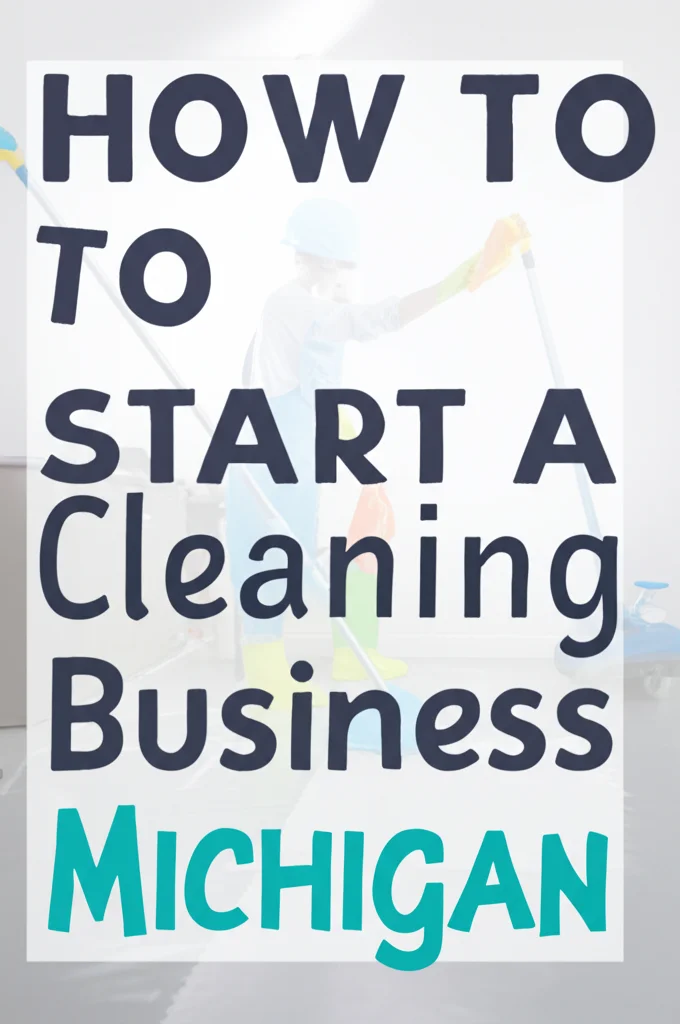· Business & Finance · 8 min read
How To Start A Cleaning Business In Michigan

Launch Your Cleaning Venture: Starting a Cleaning Business in Michigan
Are you considering a career change or looking for a business opportunity with relatively low startup costs? Starting a cleaning business in Michigan can be a fantastic option. The demand for reliable cleaning services is consistently high, and Michigan offers a diverse market from bustling cities to quiet suburban areas. This guide will walk you through everything you need to know to launch a successful cleaning business in the Great Lakes State. We’ll cover legal requirements, essential equipment, marketing strategies, and more, ensuring you’re well-prepared to thrive.
Starting a cleaning business in Michigan requires careful planning and execution. It’s more than just showing up with a mop and bucket; it involves understanding local regulations, building a strong brand, and providing exceptional service. This article will provide a comprehensive roadmap to help you navigate the process and build a profitable cleaning business.
Quick Answer: To start a cleaning business in Michigan, you need to register your business name, obtain any necessary licenses (depending on your structure and location), secure liability insurance, define your services, and market your business to potential clients.
1. Business Planning & Defining Your Niche
Before you even think about cleaning supplies, you need a solid business plan. This document will serve as your roadmap and help you secure funding if needed. Start by defining your target market. Will you focus on residential cleaning, commercial cleaning, or a specialized service like move-in/move-out cleaning?
Consider these factors when defining your niche:
- Residential Cleaning: Targeting homeowners and renters. This is a broad market with consistent demand.
- Commercial Cleaning: Focusing on offices, retail spaces, and other businesses. This often involves larger contracts and potentially more consistent income.
- Specialty Cleaning: Offering services like deep cleaning, carpet cleaning, window washing, or post-construction cleanup. This allows you to charge premium rates.
- Green Cleaning: Using eco-friendly products and methods, appealing to environmentally conscious clients.
Once you’ve identified your niche, outline your services, pricing structure, and marketing strategy. A well-defined plan will set you up for success. Don’t forget to analyze your competition in the area. What services do they offer, and what are their rates? This will help you position your business effectively.
2. Legal Structure & Registration in Michigan
Choosing the right legal structure is crucial for protecting your personal assets and simplifying your taxes. Here are the most common options:
- Sole Proprietorship: Simplest structure, but you’re personally liable for business debts.
- Limited Liability Company (LLC): Offers liability protection and is relatively easy to set up.
- Corporation: More complex, but may offer tax advantages for larger businesses.
To register your business in Michigan, you’ll need to:
- Choose a Business Name: Ensure it’s available and not already in use. You can check availability on the Michigan Department of State website.
- Register Your Business: File the necessary paperwork with the Michigan Department of State. For an LLC, you’ll file Articles of Organization.
- Obtain an EIN: If you plan to hire employees or operate as an LLC or corporation, you’ll need an Employer Identification Number (EIN) from the IRS.
- Local Licenses & Permits: Check with your city or county for any local business licenses or permits required to operate a cleaning business.
3. Insurance & Bonding: Protecting Your Business
Liability insurance is essential for any cleaning business. Accidents happen, and you need to be protected from potential lawsuits. General liability insurance covers property damage and bodily injury. Consider these types of insurance:
- General Liability Insurance: Covers accidents causing property damage or bodily injury.
- Workers’ Compensation Insurance: Required if you have employees, covering medical expenses and lost wages for work-related injuries.
- Bonding: Provides financial protection to your clients if you or your employees steal or damage their property.
Getting bonded can increase client trust and make you more competitive. Shop around for quotes from different insurance providers to find the best coverage at the most affordable price. Don’t skimp on insurance – it’s a vital investment in your business’s future.
4. Essential Cleaning Equipment & Supplies
Starting a cleaning business doesn’t require a huge investment in equipment, but you’ll need the basics. Here’s a checklist:
- Vacuum Cleaner: A reliable vacuum is your most important tool. Consider a commercial-grade vacuum for durability.
- Mops & Buckets: Both traditional and microfiber mops are useful.
- Cleaning Solutions: All-purpose cleaners, disinfectants, glass cleaners, and floor cleaners. Consider eco-friendly options. You might want to explore how to clean vinyl plank flooring with the right solutions.
- Microfiber Cloths: Reusable and effective for various cleaning tasks.
- Sponges & Scrub Brushes: For tackling tough stains.
- Gloves & Masks: For protecting yourself from harsh chemicals.
- Portable Vacuum: For cleaning upholstery and hard-to-reach areas.
You can purchase equipment and supplies from janitorial supply stores, online retailers, or big-box stores. Start with the essentials and add more specialized equipment as your business grows.
5. Pricing Your Services & Creating Packages
Determining your pricing is a balancing act. You need to be competitive while ensuring you’re making a profit. Consider these factors:
- Cost of Supplies: Factor in the cost of cleaning solutions, equipment, and transportation.
- Labor Costs: If you have employees, include their wages and benefits.
- Overhead Expenses: Rent, utilities, insurance, and marketing costs.
- Competition: Research what other cleaning businesses in your area are charging.
- Service Complexity: Charge more for specialized services like deep cleaning or move-out cleaning.
Create different cleaning packages to appeal to a wider range of clients. For example:
- Basic Cleaning: Dusting, vacuuming, mopping, and bathroom cleaning.
- Deep Cleaning: Includes everything in the basic package plus detailed cleaning of kitchens, bathrooms, and other areas.
- Move-In/Move-Out Cleaning: Thorough cleaning of an empty property.
6. Marketing Your Cleaning Business in Michigan
Getting the word out about your new business is crucial. Here are some effective marketing strategies:
- Website: Create a professional website with information about your services, pricing, and contact information.
- Social Media: Use platforms like Facebook and Instagram to connect with potential clients.
- Online Directories: List your business on online directories like Yelp and Google My Business.
- Local Advertising: Consider advertising in local newspapers, magazines, or community newsletters.
- Networking: Attend local business events and network with potential clients.
- Referral Program: Encourage satisfied clients to refer their friends and family.
- Flyers & Door Hangers: Distribute flyers and door hangers in your target neighborhoods.
Remember to highlight what makes your business unique. Do you offer eco-friendly cleaning? Do you specialize in a particular type of cleaning? Let your target audience know what sets you apart.
7. Building Client Relationships & Ensuring Satisfaction
Providing excellent customer service is key to building a loyal client base. Be punctual, professional, and attentive to your clients’ needs. Communicate clearly and address any concerns promptly.
- Confirm Appointments: Send reminders to clients before scheduled cleanings.
- Listen to Feedback: Ask clients for feedback and use it to improve your services.
- Go the Extra Mile: Small gestures like leaving a thank-you note or offering a small discount can make a big difference.
- Maintain Open Communication: Be responsive to client inquiries and address any concerns promptly.
Happy clients are your best marketing tool. They’ll spread the word about your business and help you grow.
Takeaway:
- Develop a detailed business plan.
- Register your business legally in Michigan.
- Secure adequate insurance and bonding.
- Invest in essential cleaning equipment and supplies.
- Price your services competitively.
- Market your business effectively.
- Prioritize customer satisfaction.
FAQ: Starting a Cleaning Business in Michigan
Q: Do I need a business license to start a cleaning business in Michigan?
A: It depends on your business structure and location. While a general state-level business license isn’t always required, you’ll need to register your business with the Michigan Department of State and may need local licenses or permits from your city or county.
Q: How much does it cost to start a cleaning business in Michigan?
A: Startup costs vary, but you can expect to spend between $500 and $3,000. This includes equipment, supplies, insurance, and registration fees.
Q: What are the best ways to find clients for my cleaning business?
A: Effective marketing strategies include creating a website, using social media, listing your business in online directories, and networking with local businesses.
Q: Is bonding required for a cleaning business in Michigan?
A: Bonding isn’t always legally required, but it can increase client trust and make you more competitive. It protects clients from potential theft or damage.
Q: What type of insurance is most important for a cleaning business?
A: General liability insurance is the most important, as it protects you from claims of property damage or bodily injury. Workers’ compensation insurance is also crucial if you have employees.
Q: How do I handle taxes as a cleaning business owner?
A: You’ll need to pay self-employment taxes if you’re a sole proprietor or LLC member. Consult with a tax professional to ensure you’re complying with all applicable tax laws.
Starting a cleaning business in Michigan offers a rewarding opportunity for entrepreneurs. By following these steps and dedicating yourself to providing excellent service, you can build a thriving and profitable business. Remember to stay organized, adapt to changing market conditions, and always prioritize customer satisfaction.
- cleaning business
- Michigan business
- start a business




